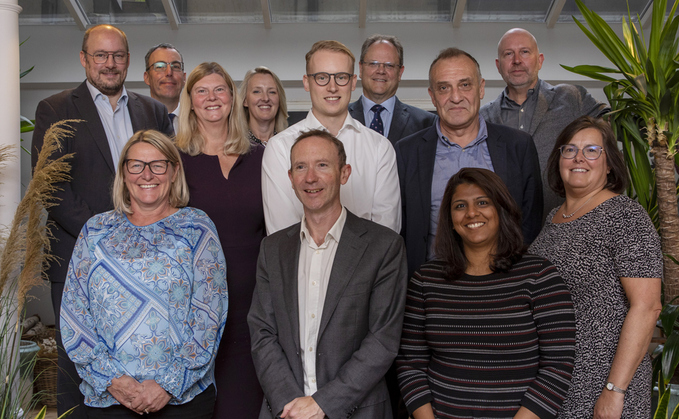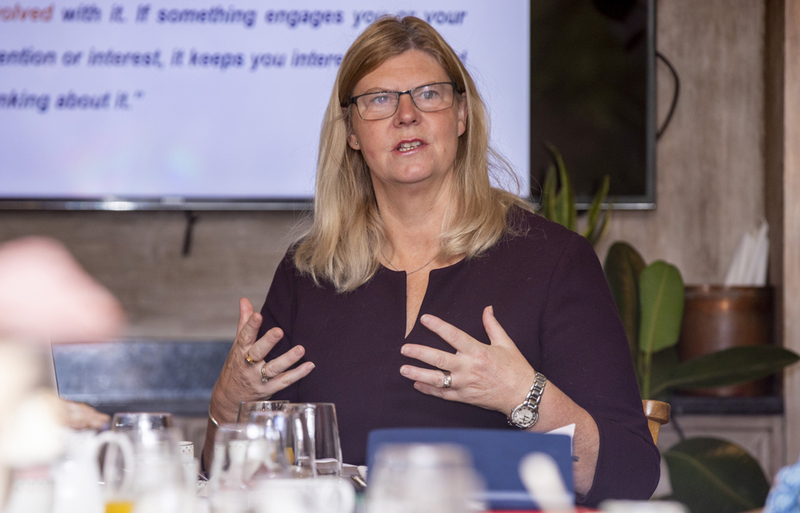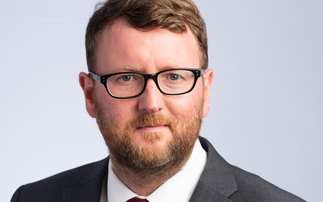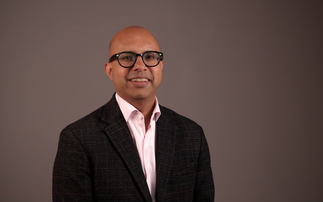
The panellists were (top row) LCP partner Stephen Budge, Professional Pensions editor Jonathan Stapleton, Ignition House director Janette Weir, XPS head of DC Sophia Singleton, SEI institutional sales associate Ryan McGowan, Aon partner John Foster, NEST head of market research and insight Ric Tizard and Nigel Aston (bottom row) Mercer partner and UK DC consulting leader Gail Philippart, Redington head of DC Jonathan Parker, PwC director of DC pensions Roshni Patel and SEI client director Nicky Benstead
At the end of September last year, Professional Pensions (PP) assembled a panel of experts to discuss the ownership crisis in pensions.
The roundtable talked through the initial findings of an in-depth study by Ignition House - commissioned by SEI - exploring what ‘ownership' really means in the context of pensions and asking what drives pension ‘ownership' compared to other financial products and other areas of life.
It also asked how members can be helped to take more responsibility for their own financial wellbeing, and the steps schemes and the industry need to take to affect real change.
The research
The roundtable - which was chaired by PP editor Jonathan Stapleton and held in association with SEI - began with a presentation on the key initial findings from the research, starting with an introduction from SEI.
SEI explained the work it had done was essentially all about agency - the concept it terms as ‘ownership'. It said the agency issue is that people in DC institutional plans have neither chosen the provider nor the asset manager - adding their financial futures in retirement are largely dependent on a number of things in a long value chain over which they have little or no control, and perhaps little or no interest.
SEI said the industry has strived for years at the lofty heights of education, but noted this has not really worked - adding that, around the world, people do not really want to be experts. It said the industry has also tried engagement, but said this is a difficult thing to accomplish as well.
With this research, SEI said it was aiming to be more realistic. Ultimately, the firm said it believes interaction with members should be founded on ‘ownership', a concept SEI wanted to explore in its research with Ignition House.'
Ignition House director Janette Weir then presented the findings so far.
Why is ownership important?
Janette Weir: First, we need to understand what people think we mean when we say the word 'ownership' - and our research of 1,000 pension scheme members reveals some pretty common themes, such as control, responsibility, and accountability, which very much ties in with formal definitions of the word.
Our roundtable panellists identified similar themes, which suggests the industry and pension scheme members agree on what ownership means.
Does this mean that pension scheme members are engaged with their DC pensions?
Janette Weir: I would suggest, and our research supports this, that ownership and engagement are different. Ownership relates to a spectrum of awareness and level of knowledge, whereas engagement relates to the next step - action. Knowing that you have something, and having a basic understanding of how that thing works, is different to regularly updating it or pursuing further knowledge about it.
For instance, a worrying 65% of those surveyed agreed with the statement: "My employer set the pension up and I trust they are making sure I am paying enough into it to have a comfortable retirement". We, in the pension industry, all know that is not true, but members do not. That is a big issue that we as an industry are going to have to face up to.
Were there any other particularly stark research findings?
Janette Weir: Our survey shows that 74%, which would be equivalent to 10.4 million people if extrapolated out, self-report low or no ownership of their pension, which is obviously very different to the members of the roundtable. That is quite disappointing given the amount of investment - both in terms of time and money - the industry puts into trying to get people to think more about their pensions.
What could be behind this, according to your research?
Janette Weir: Well, it comes back to ownership. Nearly three-quarters (72%) of those surveyed said their savings felt like their money, whereas pensions felt a bit different. Meanwhile, two-thirds (66%) said they do not pay much attention to their pension - it just sits there in the background - while 45% view pensions as a tax.
Is it possible to break those cohorts down further, so that the industry can try to target people in different ways depending on their perceived levels of ownership?
Janette Weir: Yes, this is possible to an extent. We derived four pension personas to capture the spectrum of ownership we observed, which draws on the work carried out by NEST.
These ranged from the ‘blissfully ignorant Bens and Beckys' - who self-report very little ownership, believe they have no control over their pension and have little knowledge of it - through to the ‘connected Charlies and Claires' - who have made limited changes to their pensions, have a good handle on how much they have saved, and keep track of things by logging onto their statement regularly.

Why do you think such a large proportion reported low or no ownership of their pension?
Janette Weir: This was a key question, and the biggest reason, in effect, was a lack of incentive - a ‘why should I?' mentality. These people don't know what difference taking greater ownership would make. Essentially, the industry is not giving members a good enough reason to take control of their pension.
Around a third of those surveyed (30%) said they do not think they are ever going to take ownership of their pension, and around a quarter just want their pension provider to do everything for them. To make matters even more challenging, 36% of respondents are ‘living for today', meaning they don't worry about ‘tomorrow' and their pension.
But, if there's a glimmer of hope, 17% said it was definitely possible to get them to take more ownership. Turning intention to action is difficult, but this cohort is saying it is possible.
And, in terms of encouraging greater ownership, or even engagement, 40% of respondents said they are accessing information about their pension on an app, while a similar number said they would be motivated to take greater ownership if they were given a reward, such as a shopping voucher or an opportunity to build knowledge. Others wanted somebody they could talk to and ask questions.
This suggests that improving ownership for some scheme members might not be too difficult for the industry.
The Discussion
We then turned to our panel to get their thoughts on the research - asking, first of all, whether anything in particular surprised them about the findings.
Did any of the findings surprise you or cause concern?
Sophia Singleton: The fact the research shows that people are not necessarily taking greater ownership as they get older and approach retirement (see chart below) is quite worrying.
Percentage of members self-reporting low ownership, by age
Source: SEI/Ignition House - Creating an ‘ownership mindset': How to help foster better member engagement when so few people pay attention to their pension
Note: Three-quarters (74%) of workplace pension savers reported low or no ownership of their pension. While this is undoubtedly a big percentage, Ignition House believes it is likely to be an underestimate, as its data excludes the most disconnected members. This is because respondents had to recognise that they had a workplace pension to take part in the survey.
John Foster: Regarding the ability and willingness to take ownership, I was likewise surprised at the lack of age correlation, though the level of understanding that members need to take ownership increases with age.
It's also interesting that roughly 40% of people do not know what difference they could make. This raises issues about what aspects of pension saving the industry gives members ownership of. It's about choosing the right things to try and engage people on, such as contributions, rather than asking them to decide on the likes of fund selection.
Let's bring Ric in here, given he will have delved into similar themes as part of NEST's research projects. Do these findings chime with what you've found in the past?
Ric Tizard: None of these findings surprise me at all, and they support NEST findings. If pensions are a continuum, with absolute delegation at one end and absolute control at the other, most people want to be in the middle. They're quite happy to accept default pathways, but they would like to know about them.
While our members have choices, the vast majority of them are in the default fund, so there are a high number of people who don't make a choice.
Jonathan Parker: That comes back to what would we want members to take ownership of if they took greater ownership. There is reasonable evidence to suggest that when people do take ownership of their pension investments, sometimes poor decisions are made.
Is ownership partly a red herring then?
Gail Philippart: I guess ownership could become much less of an issue if we just made sure that enough money was being put into pensions. All members would have to do then is decide when they want to retire and how they were going to take their money. If there is enough going in, then ownership is an immaterial question.
But without higher levels of ownership, and more than a third of pension savers ‘living for today', how do you tackle the contribution conundrum?
Janette Weir: For those people, the retirement message is never going to work. What seems to make a difference is to ask someone if they would rather save £20 a month today, or £200 in 10-15 years' time for a similar outcome, and they normally opt for the former.
John Foster: One of the comments in the research material from the respondents is quite enlightening on this point, as it came from someone who is quite cross that nobody has told them that they were not paying enough into their pension.
Moving from pre- to post-auto-enrolment (AE), there was some engagement with members pre-AE, but post-AE, you cannot ask them to make a decision because you are not allowed to.
Roshni Patel: And it's important to recognise that in the world of DB pensions, people were put into a scheme and looked after, sitting in the proverbial 'backseat', whereas in the DC world, members are being put into a scheme that they are supposed to drive, but nobody has taught them how. Education and guidance are missing here.
Where does that come from do you think?
Sophia Singleton: Employers can help in terms of awareness and education. If you look at students who come out of college having had to manage their finances and debts, they are much more likely to pay into their pension immediately. This shows that being more financially aware from an earlier age definitely drives better outcomes, and more engagement and ownership.
Ryan McGowan: I'd agree there's a financial literacy point here. When I joined SEI, they took me through the importance of contributing to my pension now.
Aside from that, it's driven by your environment, and I was fortunate enough that my parents guided me on such matters, but that won't always be the case for everyone.
If we acknowledge that in an ideal world there would possibly be more ownership of pensions by scheme members, and perhaps more importantly, a framework around encouraging contributions, how do we make positive steps towards that?
Jonathan Parker: I struggle with the general view that members should take more ownership of their pension for some unspecified reason.
But you can potentially encourage greater ownership if you go down the route of asking them their views on ESG/ sustainability/ stewardship, in relation to their pension investments, or getting them to fill in a death benefit form, so that their pension pot feels more tangible, as if it will make a difference to their family if the member dies.
Sophia Singleton: There has to be something in it for a member to take greater ownership, and that could be something like the ability to look after their family when they are gone.
But do we want them to take ownership of the investments they are in? My view is no, probably not.
Stephen Budge: The key decision members need to take is around whether they are paying enough into their pension. We have to drive the ownership to encourage the decision about whether to pay more in.
But this brings up a potential conflict with employers. The research shows 65% of members rely on their employer in terms of securing a good pension, but if the employer has a matched contribution structure, they may be mindful that increased member contributions will cost them more. That's why ownership has to come from individual members.
But does that suggest in some way that employers are the experts, and if so, is that a correct assertion?
Janette Weir: The research that I do with employers suggests that, particularly towards the smaller end, businesses are as clueless as the members. They don't know that the minimum contributions aren't going to be enough and so everyone is operating blind.
Ric Tizard: Yes, we find that members who receive a reasonable amount of communication from their employer have a higher tendency to be registered on the NEST website, so the employer can act as a really good ambassador for helping people to not necessarily take ownership, but just connect a little bit more.
We have really started to encourage employer communications.
But how do firms navigate this? Many people running businesses might want to help their employees in terms of their pensions, but could have concerns about this.
Roshni Patel: Employees naturally trust their employer, but the employer may feel they are at risk if they say or give the wrong information to the employees. Therefore, there is a reliance on the provider to communicate with members.
However, pension members don't always know their providers, and that's where a conflict can arise - there is no natural trust and heightened nervousness. Ownership of pensions is required across the board. Even if a member owns the fact that they are in the default fund, that is progress. If an employer can help its workers understand what they are trying to own, even if they then take no action, that's okay, because educating and doing nothing is better than doing nothing at all.
Gail Philippart: The whole thing about employers being scared to say anything is our fault as an industry. As consultants, we've spent years telling firms that they can't give financial advice, and so we have made employers scared to discuss pensions.
Given that earlier in our discussion there was the notion that ensuring healthy contributions will mitigate the need for increased ownership, are there other strategies that could mitigate the need for employers to provide education to their employees?
Gail Philippart: We have three clients that do auto-escalation, and most clients now think it is a good idea, as it is a great way to gradually ensure contributions rise, without the need for regular reviews which force every employee to consider whether they're saving enough.
There's definitely been a change in attitude in relation to this - going back a few years, businesses would have asked whether they had to tell their staff that a higher level of contribution was available.
John Foster: There's also a move by employers to ensure their pension provision is clearly communicated as part of the wider reward package for staff to help attract and retain people.
This is being partially driven by the competition for talent, so if you are an employer that is out of step with your peer group, people's awareness of pensions being a more important part of their package will be a key factor.
Does this present an opportunity for employers to brush up on their own knowledge of pension provision, so that they can clearly communicate to their staff?
John Foster: Firms need to think about the wider financial conversation, rather than seeing pensions as an adjunct to what people worry about. Employers should take the opportunity to discuss with their staff - during something like a pay review - about whether they want to put any of their salary aside, and whether it's for the short or long term, as this helps put a pension into context.
Sophia Singleton: I've seen employers succeed when their employees see value in the pension scheme because it has been put alongside the short-term savings vehicle. This shows that the firm is thinking about its people in the near term and into the future.
Are there any final thoughts from the panel in light of the research?
Gail Philippart: We need to think about how we are communicating with people to trigger the response that gets them to take action. And keeping it simple without huge amounts of legalese and jargon.
John Foster: Something like a commonly known rule could help here, like in Holland where they say that Fridays are for pensions, meaning that one day a week they're working towards saving for their pension. Something like that could help people contextualise pensions in the ‘now'.
Sophia Singleton: I know dashboards were seen as low on the list of things that would encourage ownership in the research, but I do feel that if people can see all their money in one place, that will help.
Ric Tizard: People do not know what their responsibility is, and clarification of that would be really useful. Many people do not even realise it is an investment, with many thinking it's a savings account, so there are certain fundamental education elements we must focus on to give people a little more confidence.
Roshni Patel: I believe ownership is across the board. People need to take responsibility, but we also have to recognise there is a joint responsibility to fix this relationship. This is not just about the member, but about employers, providers and trustees. Innovation is really important to increase personal ownership.
This roundtable was held on 29 September 2022 in association with SEI






